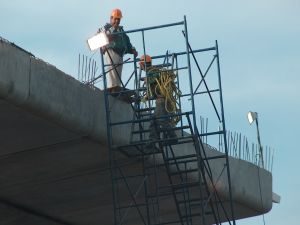Appellate Division Decision Demonstrates Enforceability of Arbitration Awards in New Jersey Construction Law
Construction Arbitration
Complex New Jersey construction law cases can be extremely expensive to litigate in court because of the amount of documents involved, the number of witnesses, and the need for experts. Therefore, many construction contracts contain arbitration provisions. The view is that arbitration can save money in the  litigation process, but still provide an enforceable dispute resolution process.
litigation process, but still provide an enforceable dispute resolution process.
However, it would not be accurate to call construction arbitration “cheap” or “inexpensive.” Essentially, arbitration is a private litigation process with limited discovery and appeal rights. By limiting discovery, particularly depositions, a significant source of expense is eliminated, and by limiting appeal rights, arbitration can provide more finality. However, there is still discovery. Documents are generally exchanged before the hearing, so there is still expense, but costs are saved because arbitration rarely involves depositions. Likewise, while experts are not normally deposed, they are still required and must prepare pre-hearing reports about their expected testimony. All of this entails significant expense. In addition, while there are minimal filing fees and the services of courts are generally free, the use of an arbitration forum in construction law disputes entails significant fees, and in addition the parties have to pay the arbitrator for all his or her time.
Thus, while arbitration may make sense in large, complex construction cases, it often is prohibitively expensive for less complicated cases. However, in either case the benefit of finality is maintained. The Appellate Division of the Superior Court of New Jersey recently issued an opinion illustrating this benefit of finality.
The Asphalt Paving Systems, Inc. Case
That opinion clearly illustrated this finality. In that case, Asphalt Paving Systems, Inc. vs. Associated Asphalt Partners, LLC and Associated Asphalt Transport, LLC, the Defendants, Associated Asphalt Partners, LLC and Associated Asphalt Transport, LLC, sold the Plaintiff, Asphalt Paving Systems, Inc., asphalt emulsion in two tanker trucks, which were subsequently stolen from Plaintiff’s property. The Defendants sued Plaintiff alleging that it was responsible. The matter was settled at mediation, with Plaintiff agreeing to give Defendants two replacement tankers. The settlement agreement provided that the parties would submit any disputes to binding arbitration, with the mediator serving as arbitrator.
A dispute did eventually arise, and the matter was submitted to arbitration. The arbitration was decided in favor of the Defendants, and the Plaintiff sought to have the arbitration award overturned because the arbitrator was biased against it. As the opinion explains:
Plaintiff later alleged that as the arbitration ended, the arbitrator asked the parties and their counsel, “What would be the result if I determined the agreement is too ambiguous to enforce?” Plaintiff also alleged that, in response, defendants’ counsel replied, “I will tell you what happens. You get sued for malpractice.”
Plaintiff alleged that the arbitrator interpreted this statement as a threat by Plaintiff’s counsel, and that this caused the arbitrator to be biased against Plaintiff, and asked a judge in the Law Division of the Superior Court of New Jersey to overturn the award. (Plaintiff used different counsel for its appeal.) After a somewhat convoluted procedural history, the trial judge held a hearing and found that while the statement was “wholly inappropriate,” it was merely “jest.” Therefore, the judge refused to overturn the arbitration award.
Plaintiff appealed to the Appellate Division. It argued that the “threat” and continued involvement of the arbitrator constituted an “appearance of impropriety.” The Appellate Division rejected this argument. It explained that this is not the standard under the New Jersey Arbitration Act. Rather, a party challenging an arbitration award must prove “evident partiality” – ie., that the arbitrator was actually biased against one side, not just that it appeared to be so. Because the Plaintiff had not proven that the arbitrator was actually partial to the Defendants or against Plaintiff the award could not be overturned. Additionally, the Appellate Division found that because the Plaintiff had not objected to the arbitrator’s continuing involvement at the time, it was barred from appealing on that basis now.
The Appellate Division therefore rejected Plaintiff’s claim and affirmed the Law Division judge’s order to deny the request to vacate the arbitration award.
The Takeaway
This opinion clearly demonstrates that if parties decide for business reasons to include an arbitration provision in a construction contract, whether because it is more cost effective or provides more finality, they should be aware that except for under the most extreme circumstances backed up by significant proof, a resulting arbitration award will withstand appeal and be enforced.
Contact Us
We represent contractors, subcontractors, owners and venders in construction law disputes in contract drafting, negotiations, arbitrations and litigation. Call one of our New Jersey construction law attorneys at (973) 890-0004 or fill out the contact form on this page to schedule a consultation. We can help.
 New Jersey Lawyers Blog
New Jersey Lawyers Blog

